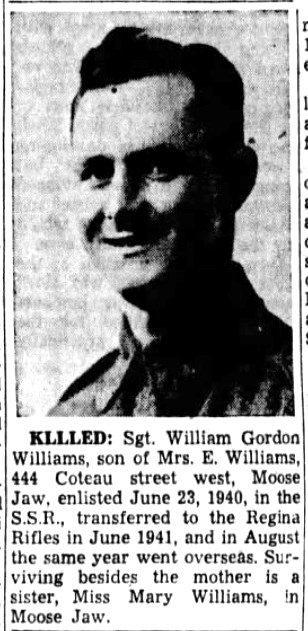MOOSE JAW — Moose Jaw soldiers William Gordon Williams and Alexander Manson (Barney) Ross participated in the D-Day invasion of Normandy, France, on June 6, 1944, but their experiences 80 years ago on Juno Beach were nothing alike.
William, better known as Gordon, was born in Moose Jaw on Dec. 5, 1920, to William and Emma Williams, who were married in the United Church in 1910. Gordon was their only son, while they also had two older daughters, Mary and Alice.
Gordon’s father died when the boy was 18.
Gordon completed Grade 8 and worked as a labourer for Smith and Parkhill Building Contractors. He enlisted in the military on June 23, 1940, in Moose Jaw at age 19. Originally, he trained at the Canadian Signals Training Centre and then joined the Regina Rifle Regiment on Aug. 16, 1941, as a rifleman.
He embarked for the United Kingdom from Halifax, N.S., with the 1st Battalion on Aug. 24, 1941. From November 1941 until June 6, 1944, Gordon rose through the ranks to become a sergeant.
Gordon’s war was short, as he was killed in action on Juno Beach on June 6. His mother received a telegraph eight days later saying that her only son had died in service of his country.
He is buried in the Beny-sur-Mer Cemetery, grave 3, row B, and plot 9.
Barney Ross was a long-time employee with the Department of National Defence, as he worked as a senior supervisor of the grounds department at the then-CFB Moose Jaw.
He was a proud, independent, and honest man who believed in the people who worked beside him and for him. He was also quick to recognize his employees’ abilities and use those skills to the best advantage.
Ross joined the army as a young man and served as a transport truck driver during the Second World War. He was eventually called to serve during Operation Overlord and the D-Day landings.
He was delivering supplies ashore during the invasion when, shortly after hitting the beach, he came under enemy fire and was shot through the right calf. This limited his ability to press the gas pedal, but he kept going until a second bullet wound to the torso prevented him from continuing.
Some troops, seeing that he was incapacitated and the vehicle no longer moving, hauled him out and put him on a landing craft to return to the ships stationed off the landing beach so he could receive medical attention.
Ross never spoke about his time during the war after the military released him from his service. In fact, according to Sue Knox, who worked under the man as a summer student, he was embarrassed that he had been shot and lived while many of his brothers-in-arms never returned to civilian life, married or had families.
“He bore those scars for years, but one day (in either 1974 or 1975), while resurfacing the runways in 35-degree (Celsius) heat, while the rest of his crew were shirtless, some in shorts and boots, he wore long sleeves and a collared shirt buttoned almost to the top and was having a difficult time with the heat,” Knox recalled.
Knox asked him why he never took off his shirt to enjoy the sun and acquire a tan during those periods when the base was shut down for summer repairs. This is when Ross told them about the war and what happened to him.
After a few minutes of thought and the guarantee from his work crew that none of them would mock him for his “untanned hide,” Ross called a work break and explained what he had gone through and the fact he was embarrassed by his wound scars.
“After much reassurance, the crew ensured him that there would be no mocking, snide jokes or comments, and that we were all very proud of the fact that we had his sacrifice to lay claim to our current social freedoms,” Knox said.
After finishing the break, Ross bared his back to the sun and showed his crew the bullet wounds. They then carried on with resurfacing the runways.
He later said that that was the first time in about 40 years that he had ever told anyone outside his family what had happened to him during the Second World War and his service to Canada.
Alexander Manson (Barney) Ross was born in 1923 and died on Nov. 2, 1987. He is buried in Sunset Cemetery.




